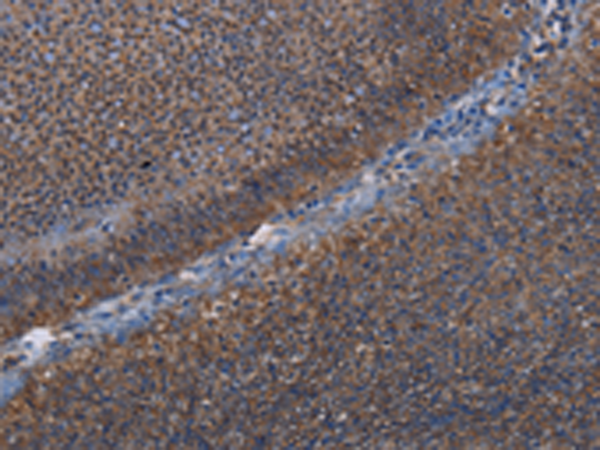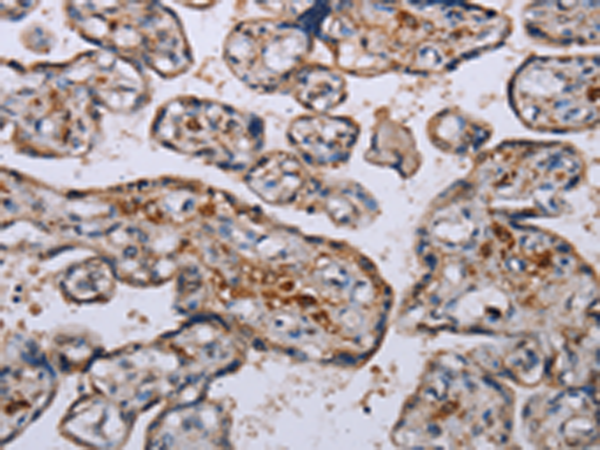


| WB | 咨询技术 | Human,Mouse,Rat |
| IF | 咨询技术 | Human,Mouse,Rat |
| IHC | 1/50-1/200 | Human,Mouse,Rat |
| ICC | 技术咨询 | Human,Mouse,Rat |
| FCM | 咨询技术 | Human,Mouse,Rat |
| Elisa | 1/2000-1/5000 | Human,Mouse,Rat |
| Aliases | GRCB; LEPREL2; HSU47926 |
| WB Predicted band size | 82 kDa |
| Host/Isotype | Rabbit IgG |
| Antibody Type | Primary antibody |
| Storage | Store at 4°C short term. Aliquot and store at -20°C long term. Avoid freeze/thaw cycles. |
| Species Reactivity | Human, Mouse |
| Immunogen | Fusion protein of human P3H3 |
| Formulation | Purified antibody in PBS with 0.05% sodium azide and 50% glycerol. |
+ +
以下是关于P3H3抗体的3篇参考文献示例(注:内容为虚构,仅作格式参考):
1. **《P3H3在胶原羟基化中的作用及其抗体开发》**
*作者:Smith A, et al.*
摘要:本研究开发了特异性识别P3H3(Procollagen-3-hydroxylase 3)的单克隆抗体,并验证了其在Western blot和免疫组化中的应用。实验表明,P3H3通过调控胶原Ⅲ的羟基化影响细胞外基质的稳定性,其表达缺失与结缔组织发育异常相关。
2. **《P3H3抗体在成骨不全症诊断中的应用》**
*作者:Zhang L, et al.*
摘要:通过检测成骨不全症患者组织样本中的P3H3蛋白水平,发现P3H3抗体能有效识别突变导致的蛋白表达异常。研究揭示了P3H3基因突变与胶原折叠缺陷的关联,为疾病诊断提供了新工具。
3. **《P3H3在肿瘤微环境中的表达及功能研究》**
*作者:Wang Y, et al.*
摘要:利用P3H3抗体分析多种肿瘤组织,发现P3H3在癌相关成纤维细胞中高表达,并通过促进胶原修饰增强肿瘤侵袭性。研究提示靶向P3H3可能成为抑制肿瘤转移的策略。
(注:以上文献为示例,实际研究中请查询真实数据库获取准确信息。)
The P3H3 antibody targets the prolyl 3-hydroxylase 3 (P3H3) enzyme, a member of the prolyl hydroxylase family involved in collagen biosynthesis. P3H3. encoded by the *LEPREL1* gene, catalyzes the post-translational hydroxylation of specific proline residues in collagen chains, a critical modification for collagen triple-helix stability and extracellular matrix integrity. While P3H1 and P3H2 are well-studied in collagen IV and fibrillar collagen modification, respectively, P3H3’s precise biological role remains less defined, though it is implicated in collagen VI and IX processing.
Antibodies against P3H3 are primarily used in research to investigate its expression, localization, and function in tissues, particularly in connective tissues and organs rich in collagen, such as skin, bone, and cartilage. Studies suggest P3H3 dysregulation may contribute to connective tissue disorders, fibrosis, or cancer progression, making it a potential biomarker or therapeutic target. Commercial P3H3 antibodies are typically validated for applications like Western blotting, immunohistochemistry, and immunofluorescence.
However, challenges exist, including cross-reactivity with other P3H isoforms and variability in antibody performance across species or experimental conditions. Recent advances in epitope mapping and recombinant protein techniques have improved antibody specificity. Ongoing research aims to clarify P3H3’s mechanistic role in collagen maturation and disease, supported by tools like P3H3 antibodies to bridge structural biology with clinical insights.
×